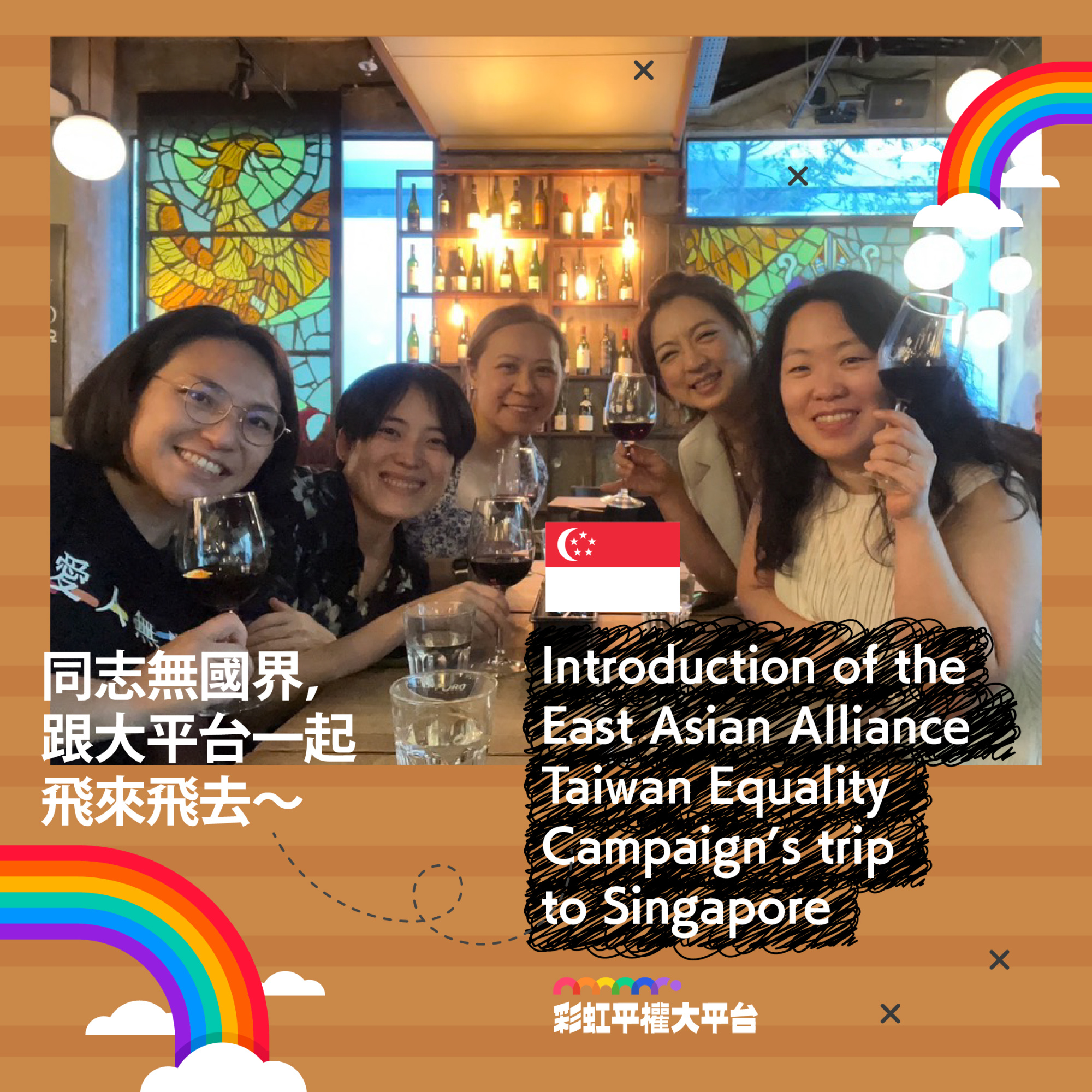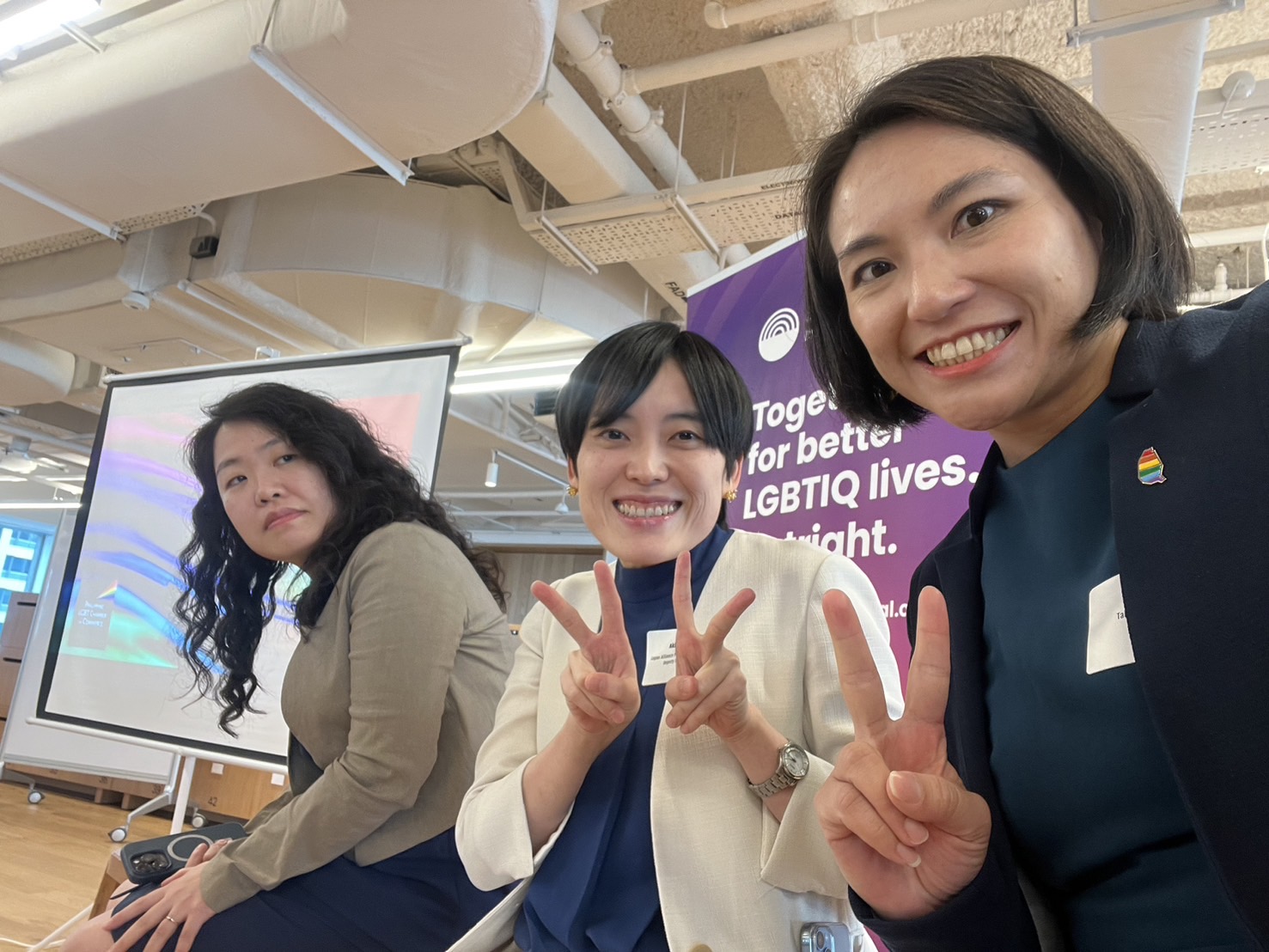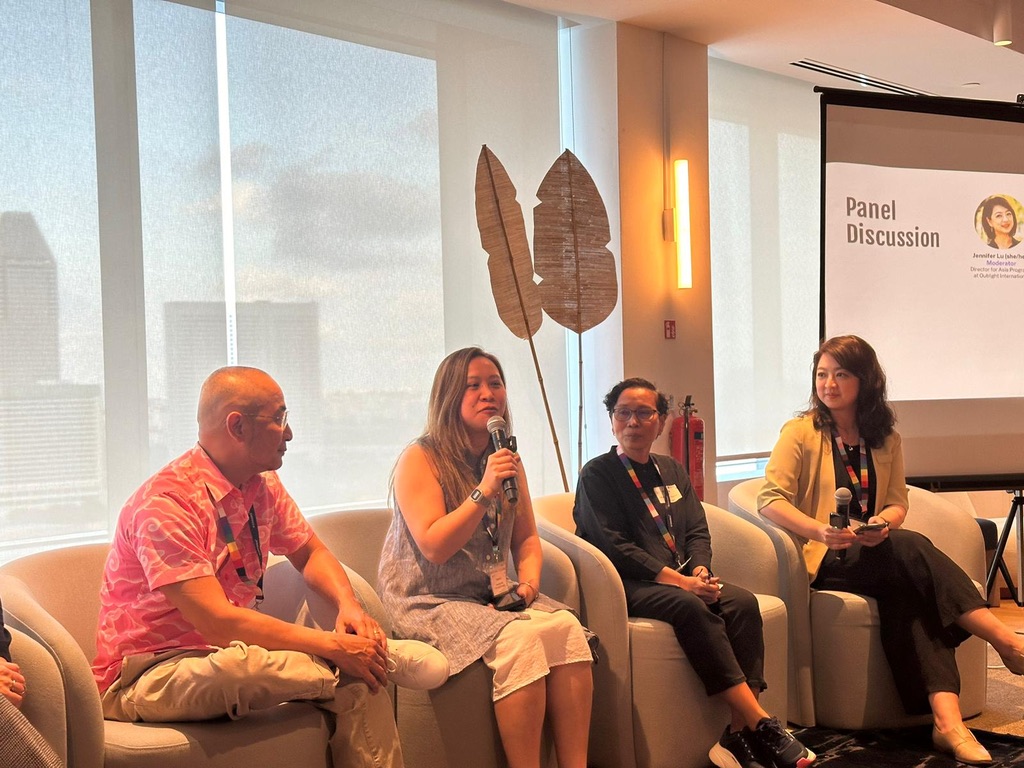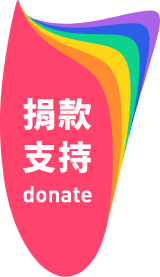Introduction of the East Asian Alliance Taiwan Equality Campaign’s trip to Singapore
Date: 2024/02/20-02/22
Location: Singapore
Goals: To connect with LGBTI+ advocates working in Asia, and build up more connections for future advocacy collaboration
Outcomes: Deepening collaboration with Korean and Japanese partners, and officially introducing the “East Asian Alliance for Anti-Discrimination” to the participants from different countries or regions.

Attending international conferences not only provides us with an opportunity to share our own ideas but also to learn from our international partners. At the end of February, TEC attended the forum Outright held in Singapore, during which we exchanged experiences with partners from other countries, and introduced the “East Asain Alliance” to the international society. In this travel log, TEC’s executive director Joyce Teng, and Senior Program Manager (International Campaign) Manyee share their feedback on the trip.
Background to the trip to Singapore
Located in the USA, Outright International advocates for multiple gender-related issues through the mechanism of the United Nations, and has been providing support for and fostering advocacy work on gender diversity conducted in different regions and countries. Early this year, Outright and Q Chamber, a Singaporean organization promoting workplace inclusion, jointly organized a forum, through which activists in Asia were given an opportunity to meet and exchange experiences with each other, fostering more collaboration and connection.
Manyee tells us that the forum was divided into two sessions: “In the daytime, roundtable discussions and exchanges of organizational experiences took place for activists to get to know each other and share the most updated situation in individual countries. In the evening, public lectures were given, to which corporate partners were also invited so that more people could learn about the diversity within the LGBTQ+ movement in Asia. Such an arrangement allowed me not only to exchange my experiences in promoting gender movements with other partners but also to introduce my work to those outside of my circle.” Participants in the forum came from various Asian countries. In addition to Joyce and Manyee, who represented Taiwan and Hong Kong, activists from the Philippines, South Korea, and Japan were also present.
During the daytime session, participants shared the challenges they each faced and the actions they took. Joyce recalls: “The activists from South Korea introduced the marriage equality movement, while the Japanese representatives talked about transgender rights and the progress made with regards to the marriage equality bill. In the meantime, TEC shared the strategies we adopted for the marriage equality campaign.” In addition, Joyce adds happily: “This was the first time that we, together with our partners from Japan and South Korea, introduced the idea of the “East Asian Alliance” on an international occasion.”

The past and present of the East Asian Alliance
The “East Asian Alliance” is formed by three NGOs jointly: TEC from Taiwan, J-ALL from Japan, and Rainbow Action from South Korea. At the forum, Joyce shared with other activists why the Alliance was needed: “The three organizations share similar backgrounds and strategies. However, on the international stage, the LGBTQ+ movement in East Asia has had very limited access to resources and has been rarely seen. By networking with our partners in Japan and South Korea, we hope to develop regional strategies suitable for East Asia. ”
The East Asian Alliance first took shape in 2023. After the invitations were sent out in September, emails were exchanged between us and the partners in Japan as well as South Korea, and online meetings were held. Finally, at the Asian Marriage Equality Conference taking place in December, the three organizations managed to meet in Bangkok, where it was discussed what the Alliance wished to achieve. The next year, at this international conference held in Singapore, the three organizations not only introduced their work individually but also presented the East Asian Alliance to the rest of the attendees. On her experiences of introducing the Alliance as TEC’s executive director, how the partners from Japan and South Korea perceive this Alliance, and on which aspects future collaboration may be possible, Joyce is very excited: “At that moment, I found this initiative not only important but significantly meaningful.”
Manyee mentions that she shared in the public lecture about TEC’s international projects and the concept of the Alliance, and her conversations with other business partners got her thinking: “Many partners asked about the details of the Alliance, and that’s when I realized that, we thought many things were clear to everyone, but they weren’t. Thus, if we could summarize and share the information, new possibilities of dialogues may be created.” She believes that such exchanges not only help pass down experiences but can also improve TEC’s own narratives.

Follow-up actions post Singapore
Joyce believes this forum will be a breakthrough for TEC's international advocacy work. “In the past, we mostly focused our work on Taiwan, but this forum allowed our international partners to see the East Asian Alliance, a joint initiative of Taiwan, Japan, and South Korea. It has also facilitated us to think about the goals and direction of the Alliance.” Back in Taiwan, while continuing to work on the Alliance, Joyce also plans to contact the Philippine Chamber of Commerce for the LGBTQ+ that she got to know at the forum. The Chamber networks with businesses operated by LGBTQ+ individuals, while TEC focuses on introducing a gender inclusion index for businesses and promoting LGBTQ+-inclusive workplaces. It is hoped that in the future, the two organizations may share with each other strategies to promote inclusive businesses and workplace equality, as well as discuss how to overcome difficulties and create opportunities to collaborate with regional partners. Regarding the differences between conferences and visitations, Joyce adds: “While visitations allow us to learn quickly about the local situation in other countries, attending conferences is an opportunity to observe the developments within individual countries, compare them with Taiwan, and consider the possibility of working with other countries in the future.”
Manyee sees this forum as an attempt: “Introducing the East Asian Alliance on such an international occasion was experimental and revolutionary. It also established a more vivid image for the LGBTQ+ movement in Taiwan.” Meanwhile, in Singapore, Manyee managed to confirm TEC’s visit to South Korea in April. Manyee tells us: “Every exchange paves the road for the next step. This forum in Singapore not only consolidated the collaboration of the Alliance but also encouraged our partners in South Korea and Japan to spend more time deepening their collaboration with us. Establishing international partnerships is not easy due to the different cultures and social backgrounds, and thus, communication is always needed. Every meeting and exchange is about accumulating trust and understanding, as well as helping our international partners to learn more about the context in Taiwan.”
*Manyee, the senior project manager for international advocacy, left her position at TEC in July. She shared with us about her trip in this travel log before her departure.
We invite all our followers to help us promote our international projects, pushing Asia towards gender equality.
🌍 Support TEC by making a donation, fostering an active “international society!”

